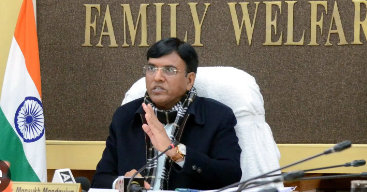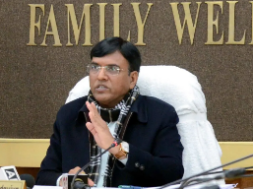
Covid-19 Cases on the Rise but No Need to Panic, Centre Holds Review Meeting
Manas Dasgupta
NEW DELHI, Dec 20: With the Covid-19 cases again on the rise, the union health ministry on Wednesday convened a review meeting of the health ministers of all the states and underscored the need for a “Whole Of Government” approach to effectively combat the emerging JN.1 coronavirus variant.
Covid-19 cases are on the rise in India, with the country recording 614 new coronavirus infections in the past 24 hours, prompting the Union Health Minister to direct states to monitor emerging strains. This is the highest number of new cases detected since May 21 with 21 cases of the JN.1 sub-variant have been detected in Goa, Kerala and Maharashtra.
The World Health Organisation (WHO), in its latest classification on Tuesday, had designated the JN.1 coronavirus strain as a “variant of interest.” However, reassuringly, the organization stated that, based on current evidence, the global public health risk posed by JN.1 was currently evaluated as low. The virus is part of the parent lineage BA.2.86 and was initially classified as a variant of interest.
Emphasising preparedness over panic, the Union Health Minister Dr Mansukh Mandaviya expressed the importance of collaboration between the central and state governments. “We need to be alert, but there is no need to panic. Let us do mock drills in all hospitals once every 3 months. There should be no laxity in our preparation, and I assure all support of the Centre to the states,” he said.
Echoing this sentiment, Kerala Health Minister Veena George emphasised the need for increased surveillance and regular mock drills in hospitals. “Surveillance has been intensified, and all tests are being sent for genome sequencing. Hospital preparedness, equipment, PPE kits – we are reviewing regularly,” the minister stated. Kerala has not only reported the first case of JN.1 subvariant in India, the state also recorded fresh three deaths in Covid-19.
Health Ministry secretary Sudhansh Pant in a presentation on the global and domestic Covid situation said cases in India were significantly less compared to the global numbers. But in the past two weeks, there has been a steep rise in active cases from 115 on December 6 to 614 on Wednesday.
Of this, 92.8 per cent of the cases are home-isolation, indicating mild illness, and no increase in hospitalisation rates have been seen due to Covid, Mr Pant said during the presentation. The cases that are hospitalised are due to other medical conditions, while Covid is an incidental finding, the Health Secretary said, adding a rise in daily positivity rate has been observed in Kerala, Maharashtra, Jharkhand, and Karnataka. Positivity rate is the number of confirmed cases per 100 tests.
Mr Pant said the JN.1 variant is under intense scientific scrutiny but not a cause of immediate concern. No clustering of cases due to the JN.1 variant has been observed in India. All the cases were found to be mild, and the patients recovered without any complications.
India’s first case of JN.1 was detected in Kerala on December 8. Earlier, a traveller from Tamil Nadu’s Tiruchirappalli district tested positive for the JN.1 variant in Singapore.
“There are about 2,300 active cases in the country. Yesterday, 519 cases were reported. About 110 new cases were reported in the last 10 days,” said Dr VK Paul. “There is nothing to worry about. The JN.1 variant has the ability to spread, but the disease is mild.”
The WHO yesterday reassured the public that current vaccines remain effective against severe disease and death caused by JN.1 and other circulating variants of the COVID-19 virus. The US Centers for Disease Control and Prevention (CDC) further supported this by indicating that there is no evidence suggesting an increased risk to public health from JN.1 compared to other circulating variants.
In the United States, the CDC reported that the JN.1 subvariant constitutes approximately 15% to 29% of cases as of December 8. However, the agency highlighted that an updated vaccine could provide continued protection against the variant. China recently detected seven infections of the JN.1 subvariant.
In India, besides Kerala, Maharashtra, apart from confirming one case of the JN.1 sub-variant, has also reported 14 new Covid-19 cases as of Tuesday. As per the latest Union Health Ministry data updated at 8 am Wednesday, India now has 2,311 active cases. Three new deaths have been reported from Kerala, taking the overall death toll to date to 5.33 lakh and the Covid-19 case tally to 4.50 crore.
Kerala has recorded the highest spike in total active cases, with 292 new cases in the past 24 hours. This is followed by Tamil Nadu (13 new cases), Maharashtra (11 new cases), Karnataka (9 new cases), Telangana and Puducherry (4 new cases), Delhi and Gujarat (3 new cases), and Goa and Punjab (1 new case), as per ministry data.
Indian SARS-CoV-2 Genomics Consortium (INSACOG) data showed that 20 cases of Covid-19 sub-variant JN.1 have been found across the country. Of these, 18 have been traced in Goa and one each in Kerala and Maharashtra.
Following the meeting, the union health minister assured the public that there was no need to panic. “Today, a review meeting was held with health ministers and senior officials of all the states and UTs of the country regarding preparedness related to respiratory illnesses (including COVID-19) and public health. In the meeting, all the states expressed a positive outlook for better implementation of health facilities,” he said on X.
“We need to be on the alert but there is no need to panic,” he added. The minister has directed officials to strengthen the surveillance system for whole genome sequencing of positive case samples to track the variants through the INSACOG network and ensure timely detection of newer variants.
As panic spread and Covid-19 came under the spotlight again, experts stepped in to say there was no need to panic – available treatments were effective, the infection was mild and all viruses mutate.
“As it happens with most respiratory viruses, including the influenza viruses, the circulating viruses keep changing. Therefore, a sub-variant of SARS CoV-2 is not a surprise at all,” the experts said.
Singapore continues to be on alert though the number of infections seems to have plateaued for now. The Singapore Ministry of Health (MOH) had reported a 75 per cent jump in cases last week, registering 56,043 cases as compared to the 32,035 cases that were recorded in the previous week.
However, the latest report in the local media said the seven-day moving average of cases has gone down slightly from 7,870 on December 12 to 7,730 on December 17. Experts said that people, especially the elderly and the vulnerable, should continue to avoid crowded spaces and use facemasks to keep infections at bay.













